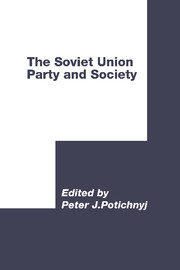Book contents
- Frontmatter
- Contents
- List of figures
- List of tables
- List of contributors
- Foreword by R. C. Elwood
- Preface by P. J. Potichnyj
- Part 1 Party apparat
- Part 2 Socialization and political discourse
- 4 Political socialization in the USSR: April 1979 and after
- 5 Political language and political change in the USSR: notes on the Gorbachev leadership
- 6 Soviet political discourse, narrative program and the Skaz theory
- 7 The nationality policy of the CPSU and its reflection in Soviet socio-political terminology
- 8 The evolution of the local soviets
- Part 3 Social policy
- Index
- Publications from the Third World Congress for Soviet and East European Studies
6 - Soviet political discourse, narrative program and the Skaz theory
from Part 2 - Socialization and political discourse
Published online by Cambridge University Press: 04 August 2010
- Frontmatter
- Contents
- List of figures
- List of tables
- List of contributors
- Foreword by R. C. Elwood
- Preface by P. J. Potichnyj
- Part 1 Party apparat
- Part 2 Socialization and political discourse
- 4 Political socialization in the USSR: April 1979 and after
- 5 Political language and political change in the USSR: notes on the Gorbachev leadership
- 6 Soviet political discourse, narrative program and the Skaz theory
- 7 The nationality policy of the CPSU and its reflection in Soviet socio-political terminology
- 8 The evolution of the local soviets
- Part 3 Social policy
- Index
- Publications from the Third World Congress for Soviet and East European Studies
Summary
Research done at the University of Grenoble aspires, as do other approaches (political, historic, economic), to a better understanding of the USSR. The object of the research is Soviet political discourse (hereafter abbreviated as SPD); the method employed is linguistic and semio-linguistic analysis. The corpus of the research is the collection of official political texts ranging from Pravda editorials to the reports of the General Secretary of the Communist Party, including Intourist brochures as well as numerous ideological pamphlets.
The significance of this material, which can be extremely boring to the average reader, consists in actually entering into the fiction set forth, instead of contesting it a priori; in reading the lines instead of reading between the lines; in concentrating on the reading of the text itself, independent of all personal interpretation.
Rather than trying to decipher the message or to interpret a statement by means of “hidden signs,” the analyst, distrustful of his own biases and his implicit expectations, must first of all avoid fabricating an artificial signification which might confirm his own convictions such as, for example, “the USSR is more threatening than ever” or, “the Soviet regime will soon fall” or perhaps, “the system is blocked and political power is in the hands of the military–industrial complex,” etc.
The danger of this artificial signification is even greater due to the difficulty the analyst has in choosing his place of observation.
- Type
- Chapter
- Information
- The Soviet Union: Party and Society , pp. 107 - 120Publisher: Cambridge University PressPrint publication year: 1988

